MIND YOUR MANOR
Site-specific theater productions’”that is, theatre which is performed in unconventional spaces compatible to the script’”remain mystifyingly uncommon. For example, why do outdoor versions of A Midsummer Night’s Dream have us sitting on a lawn or in some bleachers, when it could be thrilling to follow actors around in a forested location? Is it logistical? What if an audience member breaks an ankle tripping over a tree root? What if it rains?
More often than not with site-specific theater, scripts are written specifically for their location, such as Moving Arts Production of The Car Plays, which consisted of 10-minute plays where the audience moves from car to car. Some are site-generic, such as Oregon Shakespeare Festival’s Willful, which was more or less a series of non-linear scenes designed to provoke viewers to question their beliefs and values; while it occurred at different sites on the OSF campus, the play could have been staged anywhere.
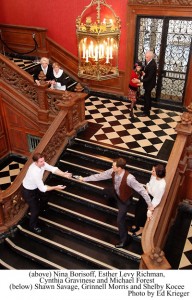 My biggest issue with site-specific theater is that the plays themselves are rarely as good as the location, making it an “event” that is more about the site than the play. However, if the audience is fed and they can intermingle with the actors, you might just have a hit on your hands. That’s why interactive theater events such as Tony and Tina’s Wedding’”where the audience interacts with the actors and are served a meal’”are largely attended by tourists, bachelorette parties, and members of the Red Hat Society.
My biggest issue with site-specific theater is that the plays themselves are rarely as good as the location, making it an “event” that is more about the site than the play. However, if the audience is fed and they can intermingle with the actors, you might just have a hit on your hands. That’s why interactive theater events such as Tony and Tina’s Wedding’”where the audience interacts with the actors and are served a meal’”are largely attended by tourists, bachelorette parties, and members of the Red Hat Society.
Los Angeles was home to one of the most successful site-specific plays ever staged in the States. Tamara, which opened in 1984, was a thrilling, well-written tale that took place in the Art Deco-styled American Legion Hall, right near the Hollywood Bowl on Highland. Audience members chose the actors they wanted to follow, so no two viewings were alike; it ran for nine years, and even starred Angelica Huston at one point.
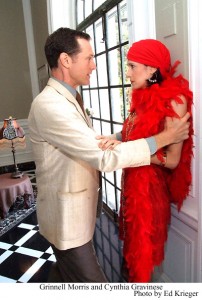 An ugly bookend to Tamara took place in Los Angeles this year. It Is Done is a play which takes place in a bar that is actually staged in a bar. Patrons sat at tables while the three actors walked among us, delivering a Twilight Zone-styled play; creepy sound effects and a working jukebox had us believing we could be in the middle of nowhere. There was only one problem: the play sucked. The true terror was not being able to move or leave.
An ugly bookend to Tamara took place in Los Angeles this year. It Is Done is a play which takes place in a bar that is actually staged in a bar. Patrons sat at tables while the three actors walked among us, delivering a Twilight Zone-styled play; creepy sound effects and a working jukebox had us believing we could be in the middle of nowhere. There was only one problem: the play sucked. The true terror was not being able to move or leave.
By design, site-specific theater should be interactive; that way, a mediocre play can still have its appeal as we follow actors around’”especially if that play contains mystery or intrigue. In fact, to this day, my favorite site-specific theater is Knott’s Scary Farm and its horror mazes at Halloween; there may be little in the way of storytelling, but it’s experiential and causes me to feel something: I laugh, I shriek, and I metaphorically shit in my pants.
Bits and pieces of all the aforementioned site-specific theater snugly fits the mold of Katherine Bates’ The Manor, which has been revived ten years now (and appears to be remounted annually) at Greystone Mansion in Beverly Hills (a.k.a. the Doheny Mansion). It is an account of the victories and tribulations of the affluent MacAlister family during the 1920s and ’˜30s, but the device on hand is a fictionalized retelling of the infamous Doheny family staged at the scene of the family’s crimes’”both Doheny’s involvement in the Teapot Dome scandal and the murder of a family member. In the play, patriarch tycoon Charles MacAlister (Darby Hinton) and wife Marion (playwright Bates) offer their sumptuous mansion as a wedding present to their son Sean (Shawn Savage) and daughter-in-law Abby (Shelby Kocee), whose father Frank happens to be the family lawyer (Michael Bonnabel). At the wedding which opens the play, the seeds are sown for the eventual political scandal and murder which inspired the play to begin with.
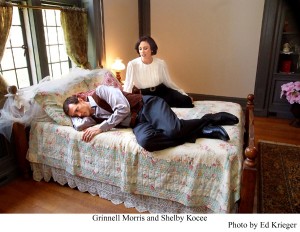 Instead of being moved from auto to auto like the Car Plays, the audience is escorted from room to room. At first, we are all watching the same scene, but then we are broken up into three smaller groups and escorted to other rooms where another scene is played out three times, once for each group, eliminating the need for discussion between audience members as to what occurred somewhere else. Our guides are stoic butler James (David Hunt Stafford), mute maid Ellie (Esther Levy Richman) and housekeeper Ursula (Nina Borisoff, sporting a foreign dialect, presumably because the actress is from Russia’”her accent had no bearing on plot).
Instead of being moved from auto to auto like the Car Plays, the audience is escorted from room to room. At first, we are all watching the same scene, but then we are broken up into three smaller groups and escorted to other rooms where another scene is played out three times, once for each group, eliminating the need for discussion between audience members as to what occurred somewhere else. Our guides are stoic butler James (David Hunt Stafford), mute maid Ellie (Esther Levy Richman) and housekeeper Ursula (Nina Borisoff, sporting a foreign dialect, presumably because the actress is from Russia’”her accent had no bearing on plot).
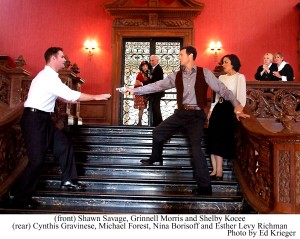 It’s a shame that the role of the spectator is inconsistent. The first act has assigned audience members as guests of a wedding, yet we are seated on folding chairs watching the actors as if they were on stage. When we follow the “actor/leaders” to another room, we suddenly become flies on the wall, eavesdropping on the conversation. In the second act, the audience is not assigned any role at all, yet we are still escorted from room to room by the emotive staff, including the mute maid, who has no backstory whatsoever (whether her character had been drawn from reality or not, her muteness becomes a red herring; I kept thinking she would know something terrible, but be incapable of telling anyone about it; instead, she just guided us with hands raised’”and occasionally a pained expression’”to another room).
It’s a shame that the role of the spectator is inconsistent. The first act has assigned audience members as guests of a wedding, yet we are seated on folding chairs watching the actors as if they were on stage. When we follow the “actor/leaders” to another room, we suddenly become flies on the wall, eavesdropping on the conversation. In the second act, the audience is not assigned any role at all, yet we are still escorted from room to room by the emotive staff, including the mute maid, who has no backstory whatsoever (whether her character had been drawn from reality or not, her muteness becomes a red herring; I kept thinking she would know something terrible, but be incapable of telling anyone about it; instead, she just guided us with hands raised’”and occasionally a pained expression’”to another room).
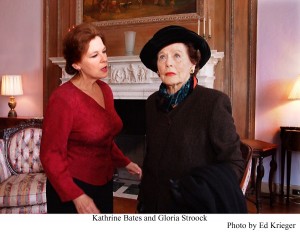 The Manor is not really for history buffs, as production company Theatre 40 could not obtain the rights to use the Doheny name. Therefore, the fictionalized story just happens to take place in the home of the family who inspired it. Greystone Mansion is owned by the city of Beverly Hills; while the beautiful grounds are open to the public, the mansion interior is open only for filming, special events, and private ranger tours. But once we’re inside, it is truly odd to follow 1920s’ characters around the first floor of the opulent mansion when the walls are lined with historical waysides about the original interior. (Equally odd are the promised refreshments served at intermission: for $65 one expects more than peanut butter crackers and tiny cans of apple juice; it was also a wasted opportunity to use the gorgeous courtyard for another scene).
The Manor is not really for history buffs, as production company Theatre 40 could not obtain the rights to use the Doheny name. Therefore, the fictionalized story just happens to take place in the home of the family who inspired it. Greystone Mansion is owned by the city of Beverly Hills; while the beautiful grounds are open to the public, the mansion interior is open only for filming, special events, and private ranger tours. But once we’re inside, it is truly odd to follow 1920s’ characters around the first floor of the opulent mansion when the walls are lined with historical waysides about the original interior. (Equally odd are the promised refreshments served at intermission: for $65 one expects more than peanut butter crackers and tiny cans of apple juice; it was also a wasted opportunity to use the gorgeous courtyard for another scene).
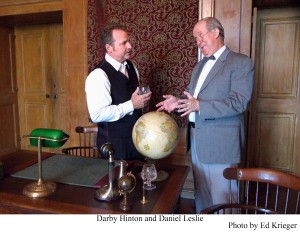 The Manor is not really for those who crave a great play. Katherine Bates’ drama is as soapy as an episode of Dynasty (in fact, Dynasty: The Reunion was filmed at the manse). Take the new bride Abby: Her true love is not her new husband, but the gorgeous and mentally unpredictable Gregory (Gabriel Myers), who is in a loveless marriage to a loud-mouthed, dance-hall floozy named Henrietta Havesham (Cynthia Gravinese). And during the wedding party, Abby is so adamant about losing her virginity that she abandons us, her party guests, who are soon thereafter escorted into a boudoir to watch her change into nighties. But in true soap opera fashion she has a change-of-heart once the bridegroom appears and decides to wait.
The Manor is not really for those who crave a great play. Katherine Bates’ drama is as soapy as an episode of Dynasty (in fact, Dynasty: The Reunion was filmed at the manse). Take the new bride Abby: Her true love is not her new husband, but the gorgeous and mentally unpredictable Gregory (Gabriel Myers), who is in a loveless marriage to a loud-mouthed, dance-hall floozy named Henrietta Havesham (Cynthia Gravinese). And during the wedding party, Abby is so adamant about losing her virginity that she abandons us, her party guests, who are soon thereafter escorted into a boudoir to watch her change into nighties. But in true soap opera fashion she has a change-of-heart once the bridegroom appears and decides to wait.
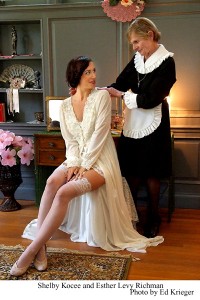 I tell you, I could barely see through the bubbles. Had this been The Car Plays, that couple would have done it right in front of us’”now that’s interactive entertainment. But other than the scandal’”which revolves around mineral leasing rights and a senator (Daniel Leslie)’”and an anticlimactic murder, the drama is as thin and dry as the peanut butter crackers.
I tell you, I could barely see through the bubbles. Had this been The Car Plays, that couple would have done it right in front of us’”now that’s interactive entertainment. But other than the scandal’”which revolves around mineral leasing rights and a senator (Daniel Leslie)’”and an anticlimactic murder, the drama is as thin and dry as the peanut butter crackers.
So who should attend The Manor? Well, soap opera enthusiasts, naturally. But this is also precisely the sort of event that you bring mom to when she visits from out of town. It’s also perfect for members of The Red Hat Society and ladies-who-lunch in general. The acting vacillates from very good to mannered (six of the roles are double-cast), the staging can be awkward (has Beverly Olevin revisited her direction since 2002?), and the script could be sponsored by Proctor & Gamble. This event isn’t horrible by any means. In fact, the set-up is phenomenally clever. But the enterprise as a whole feels safe. The Manor is like Greystone itself: It’s great to look at, but is basically empty and could use some interior decoration.
photos by Ed Krieger
The Manor
Theatre 40 at Greystone Mansion
905 Loma Vista Drive, off Doheny Road in Beverly Hills
ends on August 30, 2012
EXTENDED annually; next run January 11–January 27, 2019
for tickets, call 310.364.3606 or visit Theatre 40
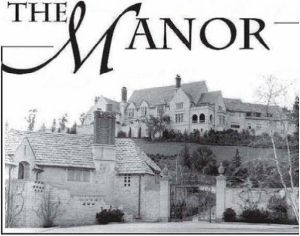

{ 5 comments… read them below or add one }
“There was only one problem: the play sucked. The true terror was not being able to move or leave.”
You crack me up!
Seating is very limited for “The Manor” and makes for an amazingly intimate evening.
I’d like to see it if it’s ever done again. I missed it in 2018.
And you just missed it again, Jim. The show plays annually, usually in the winter. Call 310.364.3606 or visit Theatre 40 for future dates.
The production I saw with Saddleback College was amazing. I wish my sister could have seen it. I would certainly see it again and I just saw it yesterday, February 29, 2020 and I had to hobble with a cane from room to room. But, I would do it again just so my sister could have this experience, preferably with the same cast. The whole bus load enjoyed it. It left us exhausted but exhilarated! Thank you for the experience. Will they have another production this year?